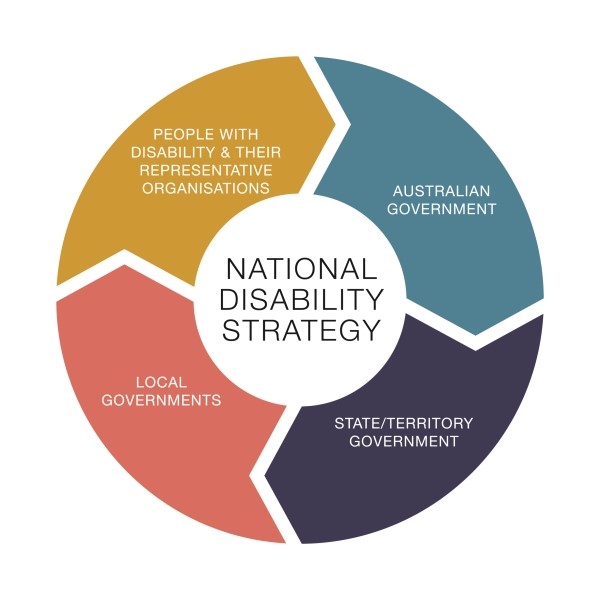National Disability Strategy 2010-2020
WE MAKE INCLUSION HAPPEN by collaborating on a national approach to supporting people with disability to maximise their potential and participate as equal citizens in Australian society.

All governments are committed to a national approach to supporting people with disability to maximise their potential and participate as equal citizens in Australian society.
The development of this National Disability Strategy (the Strategy) is the first time in Australia’s history that all governments have committed to a unified, national approach to improving the lives of people with disability, their families and carers, and to providing leadership for a community-wide shift in attitudes.
The outcomes and policy directions identified in this document are reflected in the structure and content of this Involved website, as the ACT Government is strongly committed to progressing the vision of the Strategy.
Inclusive and Accessible Communities - People with disability live in accessible and well designed communities with opportunity for full inclusion in social, economic, sporting and cultural life
- Increased participation of people with disability, their families and carers in the social, cultural, recreational and sporting life of the community.
- Improved accessibility of the built and natural environment through planning and regulatory systems, maximising the participation and inclusion of every member of the community.
- Improved provision of accessible and well designed housing with choice for people with disability about where they live.
- A public, private and community transport system that is accessible for the whole community.
- Communication and information systems to be accessible, reliable and responsive to the needs of people with disability, their families and carers.
Rights Protection, Justice and Legislation - People with disability have their rights promoted, upheld and protected
- Increased awareness and acceptance of the rights of people with disability.
- Remove societal barriers preventing people with disability participating as equal citizens.
- People with disability to have access to justice.
- People with disability to be safe from violence, exploitation and neglect.
- More effective responses from the criminal justice system to people with disability who have complex needs and heightened vulnerabilities.
Economic Security: People with disability, their families and carers have economic security, enabling them to plan for the future and exercise choice and control over their lives
- Increased access to employment opportunities as a key to improve economic security and personal wellbeing for people with disability, their families and carers.
- Income support and tax systems to provide an adequate standard of living for people with disability, their families and carers, while fostering personal financial independence and employment.
- Improved access to housing options that are affordable and provide security of tenure.
Personal and Community Support: People with disability, their families and carers have access to a range of supports to assist them to live independently and actively engage in their communities
- A sustainable disability support system which is person-centred and self-directed, and which maximises opportunities for independence and participation in the economic, social and cultural life of the community.
- The disability support system to be responsive to the particular needs and circumstances of people with complex and high needs for support.
- Universal personal and community support services are made available to meet the needs of people with disability, their families and carers.
- The role of families and carers to be acknowledged and supported.
Learning and Skills: People with disability achieve their full potential through their participation in an inclusive high quality education system that is responsive to their needs. People with disability have opportunities to continue learning throughout their lives
- Strengthen the capacity of all education providers to deliver inclusive, high quality educational programs for people with all abilities from early childhood to adulthood.
- Focus on reducing the disparity in educational outcomes for people with disability and others.
- Ensure that Government reforms and initiatives for early childhood, education, training and skill development are responsive to the needs of people with disability.
- Improve pathways for students with disability from school to further education, employment and life-long learning
Health and Wellbeing: People with disability attain highest possible health and wellbeing outcomes throughout their lives
- All health service providers (including hospitals, general practices, specialist services, allied health, dental health, mental health and population health programs and ambulance services) have the capability to meet the needs of people with disability.
- Timely, comprehensive and effective prevention and early intervention health services for people with disability.
- Universal health reforms and initiatives to address the needs of people with disability, their families and carers.
- Factors fundamental to wellbeing and health status such as choice and control, social participation and relationships, to be supported in government policy and program design
Further information
National Disability Strategy (Department of Social Services) (Including Easy English and Audio versions)
National Disability Strategy 2010-2020 (76 page PDF version)
 Turn on high contrast mode
Turn on high contrast mode Increase font size
Increase font size
